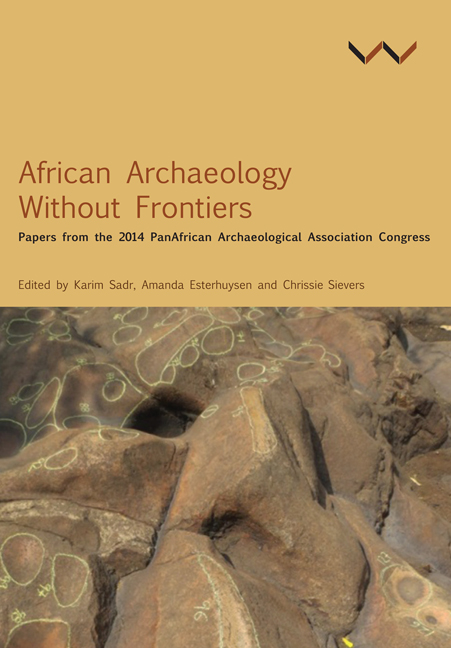 African Archaeology Without Frontiers
African Archaeology Without Frontiers Book contents
- Frontmatter
- Contents
- Acknowledgements
- List of Figures and Tables
- Introduction: An Invitation Fulfilled
- Keynote Address 1: Imagining an African Archaeology Without Frontiers
- Keynote Address 2: A Continental Vision for African Archaeology
- 1 The ‘Useable’ Archaeology of African Farming Systems
- 2 Defining Cultural Heritage among the Makonde of Tanzania
- 3 The Indigenous Roots of Swahili Culture in Pangani Bay, Tanzania
- 4 Is This an Anvil? Iron Bloom Crushing Sites in Northern Togo
- 5 L'art Rupestre au Cameroun, Nouvelles Découvertes et Contribution à L'iconographie Sous-Régionale
- 6 Archaeology and History in Iron Age Settlements in the Congo Basin
- 7 Learning from Glass Trade Beads at Thabadimasego, Botswana
- 8 Blurring Boundaries: Forager–Farmer Interactions in the Middle Limpopo Valley
- 9 Heritage Management and the World Wide Web: South African Challenges
- Contributors
- Index
6 - Archaeology and History in Iron Age Settlements in the Congo Basin
Published online by Cambridge University Press: 15 March 2018
- Frontmatter
- Contents
- Acknowledgements
- List of Figures and Tables
- Introduction: An Invitation Fulfilled
- Keynote Address 1: Imagining an African Archaeology Without Frontiers
- Keynote Address 2: A Continental Vision for African Archaeology
- 1 The ‘Useable’ Archaeology of African Farming Systems
- 2 Defining Cultural Heritage among the Makonde of Tanzania
- 3 The Indigenous Roots of Swahili Culture in Pangani Bay, Tanzania
- 4 Is This an Anvil? Iron Bloom Crushing Sites in Northern Togo
- 5 L'art Rupestre au Cameroun, Nouvelles Découvertes et Contribution à L'iconographie Sous-Régionale
- 6 Archaeology and History in Iron Age Settlements in the Congo Basin
- 7 Learning from Glass Trade Beads at Thabadimasego, Botswana
- 8 Blurring Boundaries: Forager–Farmer Interactions in the Middle Limpopo Valley
- 9 Heritage Management and the World Wide Web: South African Challenges
- Contributors
- Index
Summary
Abstract
Currently, the north-western Congo Basin – a crucial region as far as the so-called ‘Bantu expansion’ is concerned – represents almost a white spot on the archaeological map of central Africa. This paper aims at providing the outline of a settlement history of the region. It is based on a survey of 123 sites along the rivers Ubangi, Lua, Sangha, Ngoko and Likwala-aux-Herbes (Democratic Republic of the Congo, Republic of the Congo, Cameroon and Central African Republic) carried out in 1985 and 1987 by a team of archaeologists under the direction of Manfred Eggert. An analysis of the ceramics encountered in this region is part of my ongoing PhD thesis, which is supervised by Hans-Peter Wotzka at the University of Cologne. The currently drawn sequence of pottery style groups reaches back to the first settling of the rainforest by sedentary populations in the second half of the first millennium BC. The research area is of special importance in that it represents a north to south transect from the savannas north of Bangui in the Central African Republic into the heart of the rainforest, to south of Mbandaka in the Democratic Republic of the Congo. For the first time partial polishing of sherd sections has been used to provide detailed insight into fabric variability of Iron Age pottery from the Congo Basin. Through this, an underlying, deeply rooted marker of the different pottery groups in the Congo Basin seems to emerge.
Introduction
From 1977 to 1987, the River Reconnaissance Project, directed by Manfred Eggert, focused on the archaeology of the Congo Basin (Eggert 1983, 1984a, 1993, 1996). Within its framework, extensive boat surveys were performed. In 1991, Hans-Peter Wotzka submitted his PhD thesis summarising this project's discoveries in the inner Congo Basin; the study was published in 1995 (Wotzka 1995). Wotzka was able to reconstruct the settlement history of all explored tributaries under the bend of the Congo River. The resulting sequence of pottery style groups spans the last two-anda- half millennia. He concluded that the first settlers did not penetrate the entire study area at once.
- Type
- Chapter
- Information
- African Archaeology Without FrontiersPapers from the 2014 PanAfrican Archaeological Association Congress, pp. 114 - 126Publisher: Wits University PressPrint publication year: 2016


